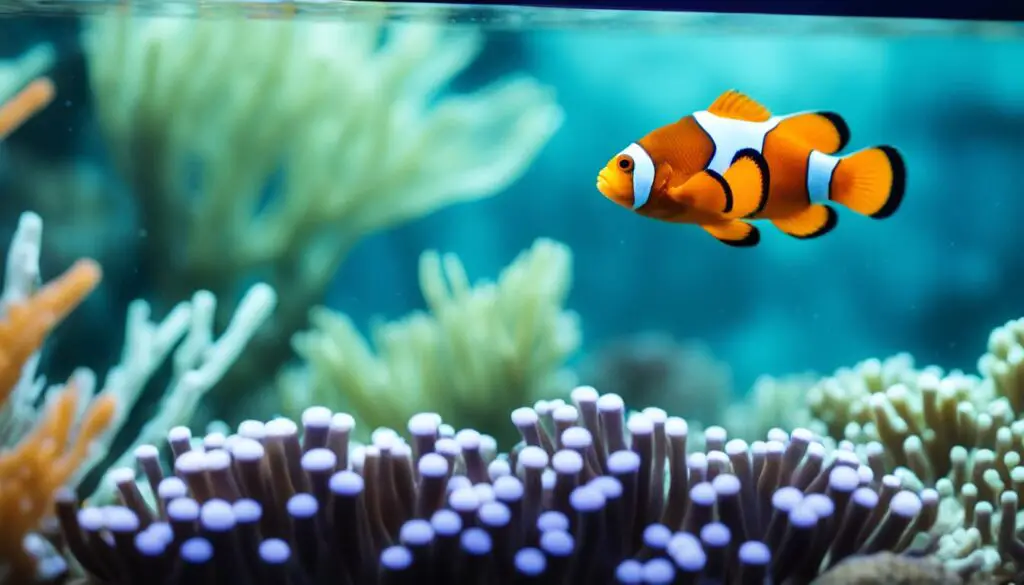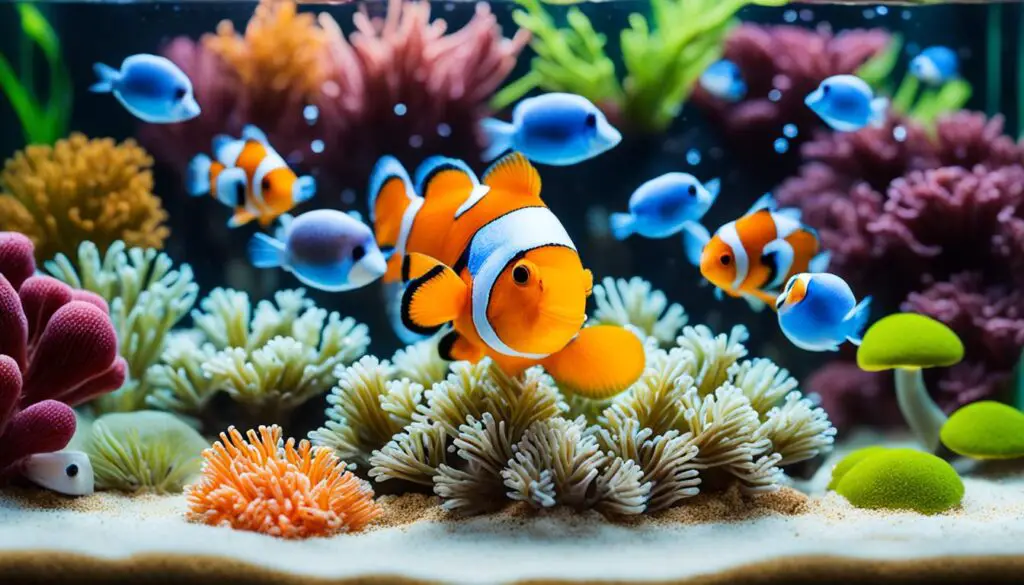What to Feed Your Parakeet: Expert Feeding Recommendations
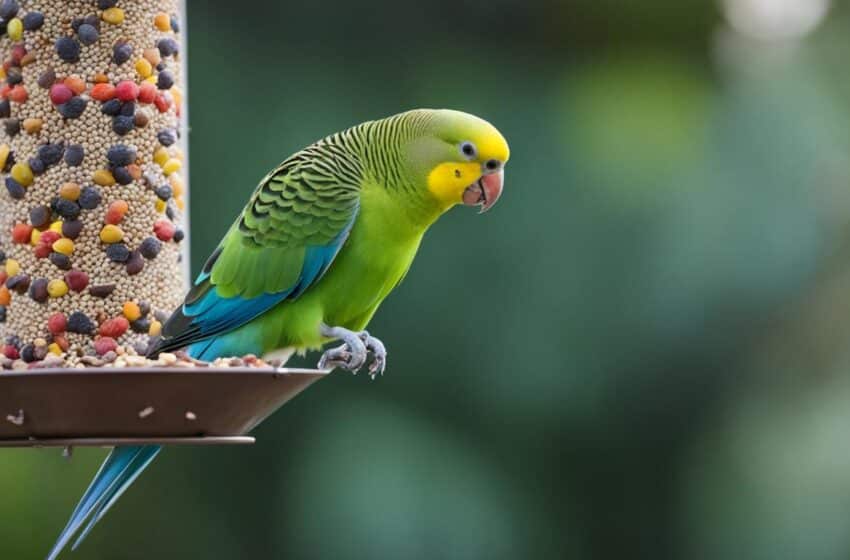
As a parakeet owner, it is essential to provide your feathered friend with the proper nutrition they need to thrive. A well-balanced diet plays a crucial role in ensuring the overall health and well-being of your parakeet. In this article, I will share expert feeding recommendations to help you understand what to feed your parakeet for optimal health and a happy bird.
Key Takeaways:
- Parakeets require a well-balanced diet to maintain their overall health.
- A balanced diet consists of seeds, fresh fruits and vegetables, and specially formulated pellets.
- Incorporate a variety of seeds in your parakeet’s diet, such as millet, sunflower seeds, and flaxseeds.
- Add fresh fruits and vegetables like leafy greens, apples, and carrots to provide essential vitamins and minerals.
- Pellets offer balanced nutrition, supporting feather health and strong bones in parakeets.
Understanding Parakeet Nutritional Needs
Parakeets have specific nutritional needs that must be met to ensure their overall health and well-being. Providing a balanced diet consisting of a variety of foods is essential for their optimal development and longevity.
While seeds are a common part of a parakeet’s diet, it’s important to understand that they are not sufficient on their own. A diet solely based on seeds can lead to nutritional deficiencies and health problems in the long run. To ensure your parakeet receives all the necessary nutrients, it’s crucial to supplement their diet with other food sources.
Fresh fruits and vegetables are excellent additions to a parakeet’s diet. They provide essential vitamins, minerals, and antioxidants that contribute to their overall health. Opt for a variety of colorful fruits and vegetables to ensure a diverse nutrient intake. Some suitable options include:
- Fruits: Offer your parakeet fresh fruits such as apples, oranges, bananas, and berries. These fruits are rich in vitamins and antioxidants, promoting a healthier immune system.
- Vegetables: Introduce leafy greens like spinach and kale, as well as crunchy vegetables like carrots and bell peppers. These options are packed with important vitamins and minerals, contributing to better overall health.
In addition to seeds and fresh produce, specially formulated pellets are recommended to ensure a well-balanced diet for your parakeet. These pellets are designed to provide all the necessary nutrients in a concentrated form. They often contain a mixture of grains, vitamins, and minerals that can help meet your parakeet’s nutritional needs.
It’s important to note that when introducing new foods to your parakeet, a gradual transition is necessary. Start by mixing small amounts of fresh fruits and vegetables or pellets with their usual seed diet. Increase the proportion of the new food over time until it makes up a significant portion of their meals.
“A balanced diet is essential for the health and well-being of parakeets. By providing a variety of foods like seeds, fresh fruits, vegetables, and pellets, you can ensure that your parakeet receives all the necessary nutrients for a healthy and happy life.” – Avian Nutritionist
Seed Mixtures for Parakeets
When it comes to feeding your parakeet, choosing the right seed mixture is crucial. A well-balanced blend of seeds ensures that your feathered friend receives the necessary nutrients for optimal health. Note: Don’t forget to supplement their diet with fresh fruits and vegetables for added variety and nutrition.
Here are some key seeds to look for when selecting a parakeet seed mixture:
| Seed Type | Nutritional Benefits |
|---|---|
| Millet | A good source of carbohydrates, B vitamins, and essential amino acids. |
| Sunflower Seeds | Rich in healthy fats, vitamin E, and antioxidants that support feather health. |
| Safflower Seeds | High in protein and fiber, promoting digestion and muscle maintenance. |
| Flaxseeds | An excellent source of essential fatty acids, including omega-3, for heart and brain health. |
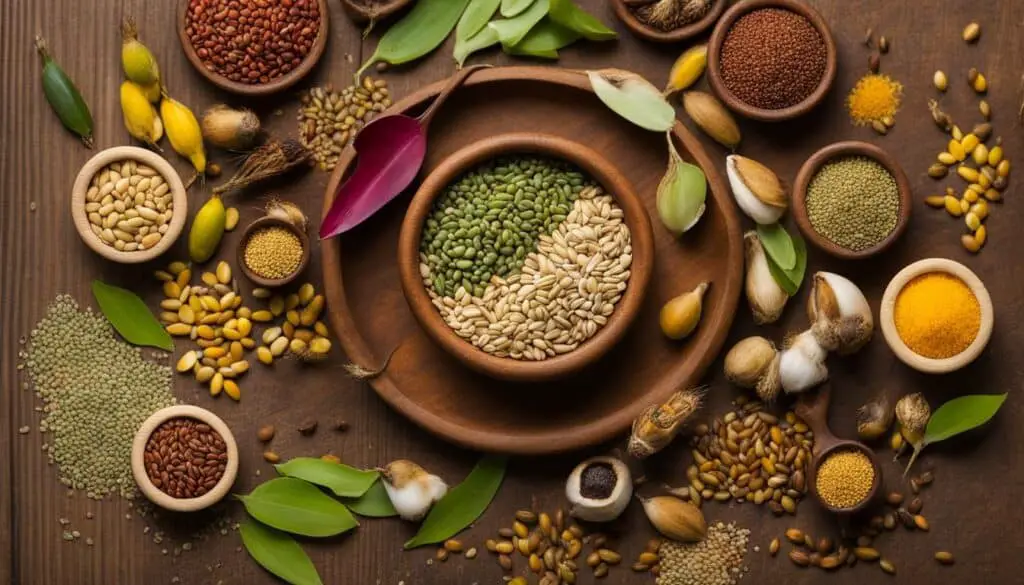
“A well-balanced seed mixture for parakeets should contain a combination of millet, sunflower seeds, safflower seeds, and flaxseeds. These seeds offer a range of nutrients that are essential for your parakeet’s overall well-being.”
By offering your parakeet a mix of seeds, you provide them with the necessary protein, carbohydrates, and healthy fats they need to thrive. Remember to monitor their seed consumption and adjust the quantity based on their activity level to prevent overeating. Supplementing their diet with fresh fruits, vegetables, and other nutritious foods will further enhance their health and happiness. Keep your parakeet satisfied and nourished with a thoughtfully chosen seed mixture!
Adding Fresh Fruits and Vegetables to Your Parakeet’s Diet
Incorporating fresh fruits and vegetables into your parakeet’s diet is essential for their overall health and well-being. These nutritious foods provide a variety of vitamins and minerals that are necessary for your parakeet to thrive. Here are some recommended fruits and vegetables to include in their diet:
Leafy Greens:
- Spinach
- Kale
Leafy greens like spinach and kale are excellent choices for your parakeet’s diet. They are rich in antioxidants, vitamins A, C, and K, and minerals like calcium and iron. These nutrients contribute to the development of strong bones, healthy feathers, and a robust immune system.
Apples:
Apples are a healthy and delicious addition to your parakeet’s menu. They are packed with fiber, vitamin C, and antioxidants, which support digestion and boost their immune system. Make sure to remove the seeds and core before serving, as they contain traces of cyanide, which can be harmful to birds.
Carrots:
Carrots are another great vegetable to include in your parakeet’s diet. They are a rich source of beta-carotene, which is converted into vitamin A in their bodies. Vitamin A is essential for maintaining healthy eyesight, promoting vibrant feather colors, and strengthening their immune system.
Bell Peppers:
Colorful and crunchy, bell peppers are an excellent choice for providing essential nutrients to your parakeet. They are high in vitamin C, which helps boost their immune system and supports the absorption of iron. Bell peppers also provide fiber and antioxidants that promote overall digestive health.
Recommended Fruits and Vegetables for Parakeets
| Fruits | Vegetables |
|---|---|
| Apples | Carrots |
| Berries (strawberries, blueberries) | Spinach |
| Grapes | Kale |
| Oranges | Bell peppers |
It’s important to offer a variety of fruits and vegetables to your parakeet to ensure they receive a well-rounded diet. Remember to wash all fruits and vegetables thoroughly before serving and remove any seeds, pits, or cores to prevent choking hazards. Gradually introduce new foods to their diet and observe their preferences and reactions for a seamless transition.
By incorporating these fresh fruits and vegetables into your parakeet’s diet, you can provide them with a diverse range of nutrients that will contribute to their overall health and happiness.
Incorporating Pellets into Your Parakeet’s Diet
When it comes to providing your parakeet with a well-rounded diet, incorporating pellets is an essential component. These specially formulated parakeet pellets offer a balanced nutrition that supports your feathered friend’s overall health, feather health, and strong bones. Packed with essential vitamins, minerals, and amino acids, fortified pellets ensure your parakeet receives the necessary nutrients for optimal well-being.
To introduce parakeet pellets into your bird’s diet, it’s important to take a gradual approach. Parakeets can be picky eaters and may initially resist the change in their food. Start by mixing a small amount of pellets with their regular seed mixture. Over time, increase the proportion of pellets while reducing the seeds, until eventually, the majority of their diet consists of pellets.
It’s worth noting that not all pellets are created equal. Look for high-quality pellets that provide a complete and balanced nutrition for your parakeet. Consider options that are fortified with vitamins and minerals specifically tailored to parakeet’s dietary needs. Consult with a veterinarian or avian nutritionist for recommendations on the best balanced nutrition for your parakeet.
In addition to pellets, continue to provide your parakeet with a variety of fresh fruits, vegetables, and seeds. These additions can further enhance their diet and contribute to their overall well-being. Remember to introduce new foods gradually and observe your parakeet’s preferences and reactions to different ingredients.
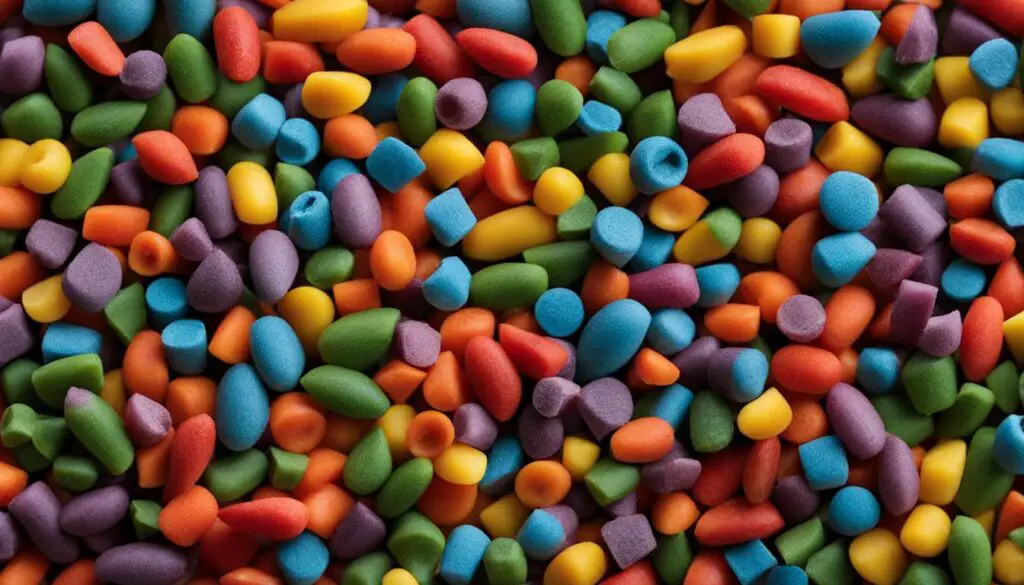
Offering a diverse range of foods ensures that your parakeet receives a w ide spectrum of nutrients to support optimal feather health and strong bones. Below is a table summarizing the benefits of incorporating pellets into your parakeet’s diet.
| Benefits of Incorporating Pellets into Your Parakeet’s Diet |
|---|
| Provides balanced nutrition with essential vitamins, minerals, and amino acids |
| Supports feather health, promoting vibrant plumage and reducing feather plucking |
| Aids in the development of strong bones and overall skeletal health |
| Reduces the risk of nutritional deficiencies |
| Helps maintain a healthy weight and prevents obesity |
By incorporating pellets into your parakeet’s diet, you are providing them with a reliable source of balanced nutrition that supports their overall health and vitality. Remember to monitor their eating habits, consult with experts, and make adjustments as needed to ensure their diet remains well-rounded and suitable for their individual needs.
Hydration and Parakeets
Proper hydration is essential for the health and well-being of your parakeet. Just like humans, parakeets need to stay hydrated to maintain their overall function and vitality. Here are some important tips to ensure your feathered friend stays hydrated:
- Provide Fresh Water: Always make sure your parakeet has access to fresh, clean water. A water dish should be available in their cage at all times. Remember to clean and refill the water dish daily to prevent bacteria or contaminants from affecting their health.
- Mist Your Parakeet: In addition to a water dish, you can use a spray bottle to mist your parakeet with water. This mimics the natural sensation of rain and can help keep their feathers clean and hydrated. Spraying a fine mist above your parakeet, not directly on them, allows them to enjoy the moisture and encourages them to preen and spread the water throughout their feathers, promoting their overall well-being.
- Offer Fruits with High Water Content: Certain fruits have high water content and can contribute to your parakeet’s hydration. Feeding your parakeet fruits like cucumbers or melons can provide not only a tasty treat but also an additional source of hydration. Ensure that you remove any seeds or pits before offering these fruits to your parakeet.
Proper hydration is essential for the health and well-being of your parakeet. By providing fresh water, misting them occasionally, and offering fruits with high water content, you can help ensure that your parakeet stays hydrated and keeps their energy levels up. Remember, a hydrated parakeet is a happy and healthy parakeet!
Conclusion
By following these expert feeding recommendations, you can ensure that your parakeet maintains a healthy and well-balanced diet. A variety of seeds, fresh fruits, and vegetables should be included in their daily meals to provide essential nutrients. Additionally, incorporating specially formulated pellets can further enhance their nutrition.
Remember, a well-balanced diet is crucial for your parakeet’s overall health and wellbeing. The right combination of nutrients from seeds, fruits, vegetables, and pellets will support their immune system, promote strong bones and feathers, and keep them mentally and physically active.
Furthermore, don’t forget to prioritize hydration. Ensure your parakeet always has access to fresh water, either through a water dish or misting. You can also offer fruits with high water content to supplement their hydration needs.
FAQ
What should I feed my parakeet?
Parakeets require a balanced diet consisting of a variety of foods. This includes seeds, fresh fruits, vegetables, and specially formulated pellets.
What kind of seeds should I include in my parakeet’s diet?
Opt for a seed mixture that includes millet, sunflower seeds, safflower seeds, and flaxseeds. These seeds provide protein, carbohydrates, and essential fatty acids for your parakeet.
What fruits and vegetables can I give to my parakeet?
Parakeets can enjoy a variety of fresh fruits and vegetables, such as spinach, kale, apples, berries, carrots, and bell peppers. These provide essential vitamins and minerals for their overall health.
How do I incorporate pellets into my parakeet’s diet?
Introduce pellets gradually into your parakeet’s diet to ensure they accept them. Pellets are specially formulated to provide balanced nutrition, including essential vitamins, minerals, and amino acids.
How can I ensure my parakeet stays hydrated?
Make sure your parakeet has access to fresh water at all times. Clean and refill their water dish daily. You can also mist your parakeet with water or offer fruits with high water content, like cucumbers or melons, to keep them hydrated.

